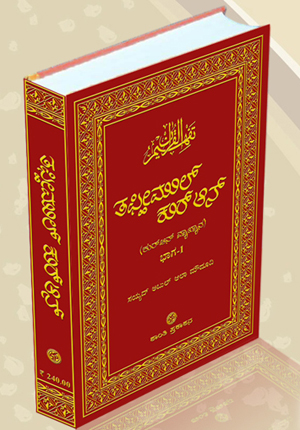 Mangalore, July 4: The Kannada translation of the first volume among the sixth volumes of world-renowned 'Tafheem-ul-Quran' will be released on Friday, July 6, in the city.
Mangalore, July 4: The Kannada translation of the first volume among the sixth volumes of world-renowned 'Tafheem-ul-Quran' will be released on Friday, July 6, in the city.
A press release issued here by Shanthi Prakashana, the publishers, stated that retired professor of Mumbai University Talthaje Vasantha Kumar would release the book at a programme in Town Hall. The programme would commence at 5:00 pm.
Dr Sayyed Akheel Ahmed, Dean of Science and Technology Department, Mysore University, Pradeep Kumar Kalkura, President of Dakshina Kannada Sahithya Parishath, B S Sharafuddeen, Guest Lecturer at Kuwait-IGNOU centre will be the chief guests on the occasion.
Dr Muhammad Saad Belagami, General Secretary of Jamath-e-Islami Karnataka will be presided over the function.
The Tafheem-ul-Quran is a six-volume translation and explanation of the Qur'an in Urudu language by Abul Ala Maududi. Maududi spent 30 years to accomplish this work from 1942 to 1972.
The work is a combination of orthodox and modernist interpretation and has influenced modern Islamic thought very deeply. This translation differs from traditional exegeses in several ways. It is more than a traditional commentary on the scripture as it contains discussions and debates regarding economics, sociology, history, and politics. In his text, Maududi highlights Quranic perspective and argues that Islam provides ample guidance in all spheres.
Maududi uses the standard technique of providing an explanation of the Qur'anic verses from the Sunnah of Prophet Muhammed (pbuh), including the historical reasons behind the verses.
The 'Tafheem-ul-Quran' deals extensively with issues faced by the modern world in general and the Muslim community in particular.
The Kannada translation of the condensed version of 'Tafheem-ul-Quran' was already published by the Shanthi Prakashana in two volumes. The same publishers are now translating the complete six volumes into Kannada. P Noor Muhammad has translated the first volume.





Comments
Add new comment